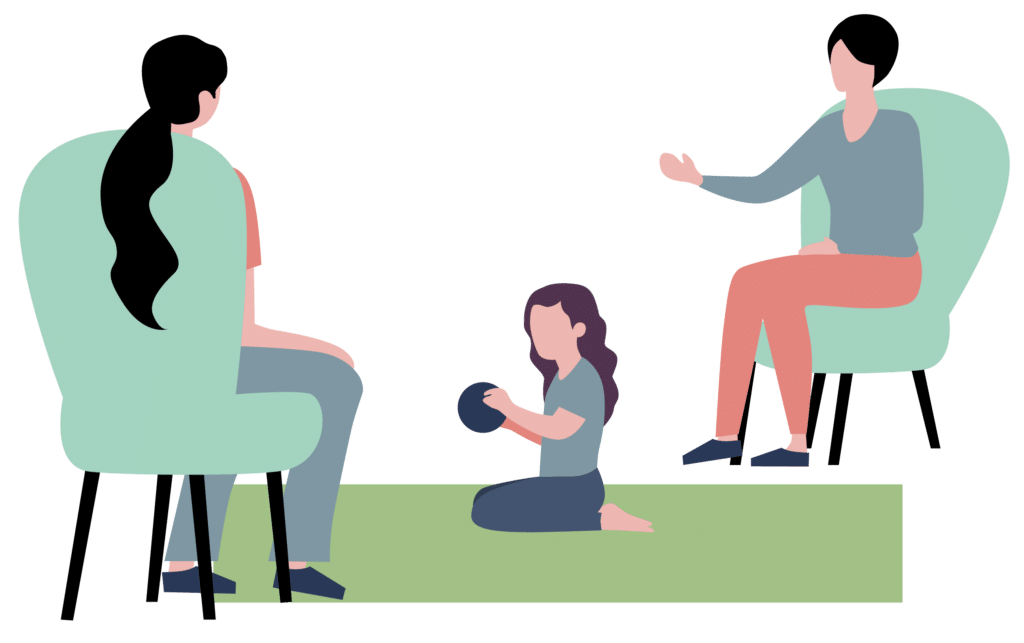Who we are
paths is made up of a team of over 30 psychologists, psychotherapists, counsellors and family therapists. We also have trainee psychotherapists and psychology assistants, allowing us to make therapy as accessible as possible. We pride ourselves on making the process of obtaining high quality psychotherapeutic support uncomplicated and we make sure to offer you an appointment within a week of making contact. We offer a comprehensive range of services including psychological interventions and psychotherapy for individuals, couples, families and children, as well as assessments for children, adolescents and adults. We also provide psychotherapeutic support to businesses through our Employee Assistance Programme (EAP) and through training seminars and consultation work tailored to our clients’ needs.

What we believe in
What we do

Educational Assessments
Some children might face difficulties in their development, resulting in developmental delays and/or learning difficulties. This might be negatively impacting their functioning across various contexts, including school and home. A psycho-educational assessment can help identify the child’s strengths together with the areas that require more intervention in order to continue supporting his/her development. Assessments are carried out for a number of neuro-developmental conditions including Autism Spectrum Disorder, ADHD, and specific learning difficulties, such as Dyslexia and Dyscalculia. Psycho-educational reports are provided to assist with school functioning, including obtaining a statement for additional class support and examination access arrangements.
Confidentiality
At paths we take the issue of confidentiality very seriously. We believe that this provides our clients with the safety that they need to trust the therapeutic process and be more open about the issues they want to discuss.
Confidentiality gives our clients the peace of mind in knowing that everything that is said between themselves and the therapist within a therapeutic context, will not be shared with anyone else unless permission to do so has been given by the clients themselves. Having said this, because we have a duty to do no harm, in cases where therapists believe that clients are in danger of harming themselves or others, or when we receive information that someone is currently being neglected or abused, they are obliged to break confidentiality. This is particularly true in the case of children and adolescents.


A note from the founder of paths,
Charlene Camilleri Duca
When I graduated back in 2012, there were very few clinics which offered a warm and inviting environment in which to see clients for personal therapy. In 2015, I opened Bloom Psychology Clinic so as to offer such a space and bring different therapists together, working under the same roof. In 2018, as the demand for therapy continued to grow, I opened TherapyWorks Clinic, with the intention of providing clients with a more structured and stable therapeutic presence. Over these years, therapy has evolved and has become much more sought out as a means of taking care of one’s mental health. This is where the idea for paths came about, as I became aware of the need to offer clients more autonomy in their search for greater well-being. paths is not just about managing one’s mental health, but more about empowering people to find their own path towards wellness. Myself and the team feel privileged to accompany our clients on this journey and look forward to providing guidance and support along the way.

Our Psychology Assistants

Michaela Scerri
Psychology Assistant
The psychology assistants at paths perform a crucial role in the smooth and efficient operation of the clinic. All have a Bachelor’s Degree in Psychology, as well as experience working within the mental health field. This allows them to provide professional and empathic support and guidance to anyone reaching out for our services, referring them to the most suitable professional on the paths team or providing information about external services which may be more appropriate. They also provide administrative and logistical support to our therapists and clients.
Our clinics
paths operates from 2 clinics located within walking distance from one another, in Gwardamangia and Msida. Our clinics house 10 therapy rooms in total, with resources to cater for children aged 3 upwards, adults, couples and families. We believe in creating an environment which is conducive to growth and wellness, so our therapy rooms are designed to make you feel safe, nurtured and contained.

Our therapists
The paths team hails from diverse backgrounds and cultures, allowing us to work empathically and effectively with clients from all walks of life, ages and cultures. We also carry out sessions in a number of different languages, including Maltese, English, Italian, Albanian, Russian, Dutch, French, Portuguese, and Spanish.
FAQs
Here are some of the most frequently asked questions that we get
Therapy involves meeting with a mental health professional to explore behaviour patterns, attitudes, beliefs, emotions, relationships and experiences which may be problematic or causing distress. The therapist provides a safe space where clients can discuss their innermost feelings and experiences without judgement. This exploration assists the client to gain deeper insight into who they are and why they behave the way they do, as well as building healthier coping skills and tools to navigate life’s challenges. Through enhanced awareness, support and guidance, therapy can help people live healthier, more rewarding lives.
Therapy sessions usually last between 50 minutes to one hour and the frequency of sessions can vary from once weekly to once monthly depending on how much support clients feel they need at that point in their lives. Such practical agreements can be discussed during the ongoing process of therapy.
The first session is a mutual assessment session, where both the client and therapist have a chance to explore whether it would be beneficial to embark on the therapeutic journey, and whether the fit between therapist and client is a good one. Usually, clients communicate what they would like to achieve through therapy, and together with the therapist, they assess whether therapy would be right for them. There is no obligation to continue therapy after the first session and the client is in complete control of their therapeutic process.
Therapy is a safe place to discuss anything that is worrying or bothering you, without fear of judgement or blame. There is no problem too big or too small to discuss with your therapist. Since therapy is also very much about self-growth and living a healthier, more rewarding life, the therapist would want to know more about you and your life. For those clients who may find it hard to open up, or feel unsure what they should discuss, the therapist will guide and support you in this process.
Psychologists, psychotherapists, family therapists and counsellors do not prescribe medication, although you may be able to discuss this with your therapist and be referred to a Psychiatrist who may suggest prescription medication.
All of these mental health professionals study and apply psychology in order to help clients lead healthy lives, with an emphasis on relieving psychologically-based issues or distress. Clinicians in the mental health field are trained in a wide range of modalities, with the goal of identifying and working through difficulties in the client’s life. The major difference between Psychologists and Counsellors, Family Therapists and Psychotherapists is that Psychologists may carry out psychological testing. Psychologists may utilise Personality or Educational assessments as part of the therapeutic process since these tests inform the Psychologist on the most effective treatment for their clients.
The most important consideration when choosing a mental health practitioner, is the connection or the ‘fit’ that you feel with that professional. Whether you choose to see a Psychologist, Counsellor, Psychotherapist or Family Therapist, we suggest that you choose a clinician that you feel can best understand you and your needs.



GET PATHS IN YOUR INBOX
Subscribe to our
mailing list
Join our mailing list to get our curated collection of relevant self-help recommendations regularly.





